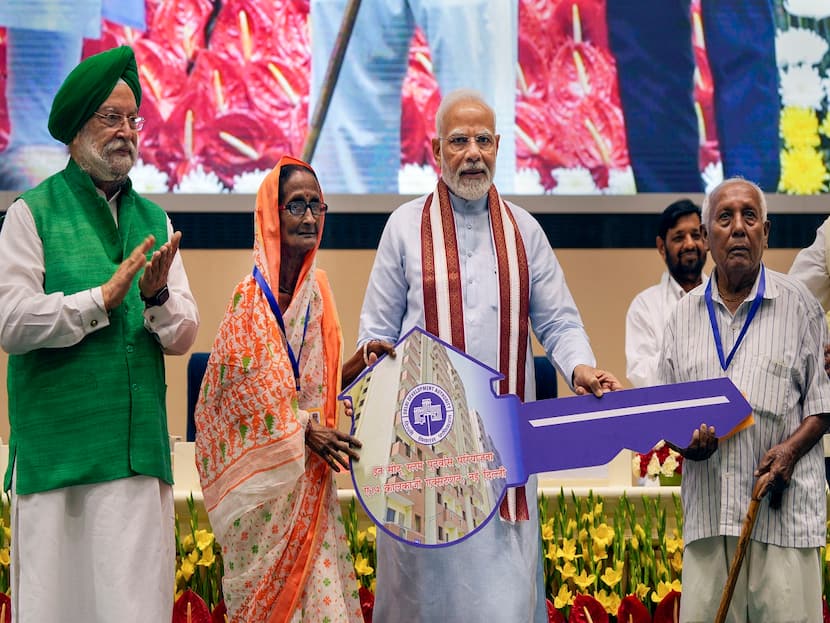

Prime Minister Narendra Modi on Wednesday handed over the keys of 3024 newly constructed EWS flats at Kalkaji, Delhi built for rehabilitating slum dwellers under the ‘In-Situ Slum Rehabilitation Project.’
Addressing the Bhoomiheen Camp gathering in a programme at Vigyan Bhawan in New Delhi, the Prime Minister said today is a big day for hundreds of families of Delhi as it is a new beginning for many jhuggi dwelling poor families.
The Prime Minister informed that more than 3.000 homes have already been prepared in the first phase of Kalkaji Extension alone. Very soon, other families living in the area will get the opportunity to enter their new homes.
“I am sure that these efforts of the central government will play a big role in making Delhi an ideal city”, he said. Remarking on the development that is witnessed and the dreams that are realised in big cities like Delhi, the Prime Minister said that the foundation of such developments and dreams is made up of the hard work and efforts of the poor.
“Paradoxically”, he said, “these poor people have been made to live in deplorable conditions. When there is such an imbalance in one single city, who can we think of holistic development? In the Azadi ka Amrit Kaal, we have to fill this huge gap. That is why, the country is moving on the path of Sabka Saath, Sabka Vikas, Sabka Vishwas and Sabka Prayas for everyone’s upliftment”
The Prime Minister pointed out that for decades, the system of governance in the country was plagued with the mentality that poverty is a poor people’s issue but the government of today belongs to the poor and it is not in its nature to leave them be.
He highlighted that the poor remain central to policy formation and decision-making systems and that the government is treating the issues of the urban poor with equal importance”, PM Modi added.
The Prime Minister said that there were 50 lakh people in Delhi, who did not even have a bank account. That deprived them of any benefit of the banking system. “They were in Delhi but Delhi was very far from them”, he said. This situation was changed by the government and a campaign for financial inclusion via opening accounts was undertaken. This resulted in direct benefits to the poor people of Delhi, including street vendors. He also commented on the ubiquitous penetration of UPI. More than 50 thousand street vendors received financial assistance under the SVANidhi scheme.
The Prime Minister said, “We are ensuring ‘Ease of Living’ for the poor in Delhi through ‘One Nation, One Ration Card’.” This proved hugely beneficial for poor segments during the pandemic. Lakhs of eligible vulnerable people are receiving free ration from the central government for the last two years.
In Delhi alone, more than Rs 2,500 crore were spent on this, he informed. The Prime Minister continued and informed that more than 40 lakh poor people in Delhi got the security of insurance. Medical expenses were brought down through Jan Aushadhi Schemes. “When there is this security in life, the poor work hard with all their might without rest. He works to lift himself out of poverty.”, he added. The Prime Minister said that all this is done without much fanfare and expansive advertisements. This is because “we live to bring change in your lives”, he said.
Speaking on the topic of unauthorised colonies in Delhi the Prime Minister acknowledged the constant worry of the people about the status of their houses. “The central government has also done the work of reducing this concern of the people of Delhi. Work is going on to regularise the houses built in unauthorised colonies of Delhi through the PM-UDAY scheme. Till now thousands of people have taken advantage of this scheme”, he said. He also mentioned that 700 crore rupees have been spent in providing interest subsidies to poor and middle-class families for constructing their own houses.
Emphasising the development in the Delhi NCR region, the Prime Minister informed about the expansion of metro routes from 190 km to 400 km after 2014. He further noted that in the last 8 years, 135 new metro stations have been added to the network which ended up saving time and money. The Prime Minister also informed that the Government of India with an investment of Rs. 50 thousand crores is widening roads to provide relief to Delhi from traffic congestion. The Prime Minister gave examples of Dwarka Expressway, Urban Extension Road, Akshardham to Baghpat 6-lane Access Control Highway and elevated corridor in the form of Gurugram-Sohna Road.
Another special flight carrying 281 Indian nationals, along with three Sri Lankan and two Nepalese…
The sixteenth meeting of the India-Nepal Bilateral Consultative Group on Security Issues (INBCGSI) was held…
Finance Minister Nirmala Sitharaman on Monday lauded the resilience of Indian exporters, highlighting that the…
Israel Defence Minister Israel Katz has accused Iran of violating the ceasefire and said that…
External Affairs Minister S Jaishankar held a meeting with South Australia's Governor Frances Adamson in…
Union Minister for Communications and Development of the Northeastern Region Jyotiraditya Scindia on Tuesday highlighted…